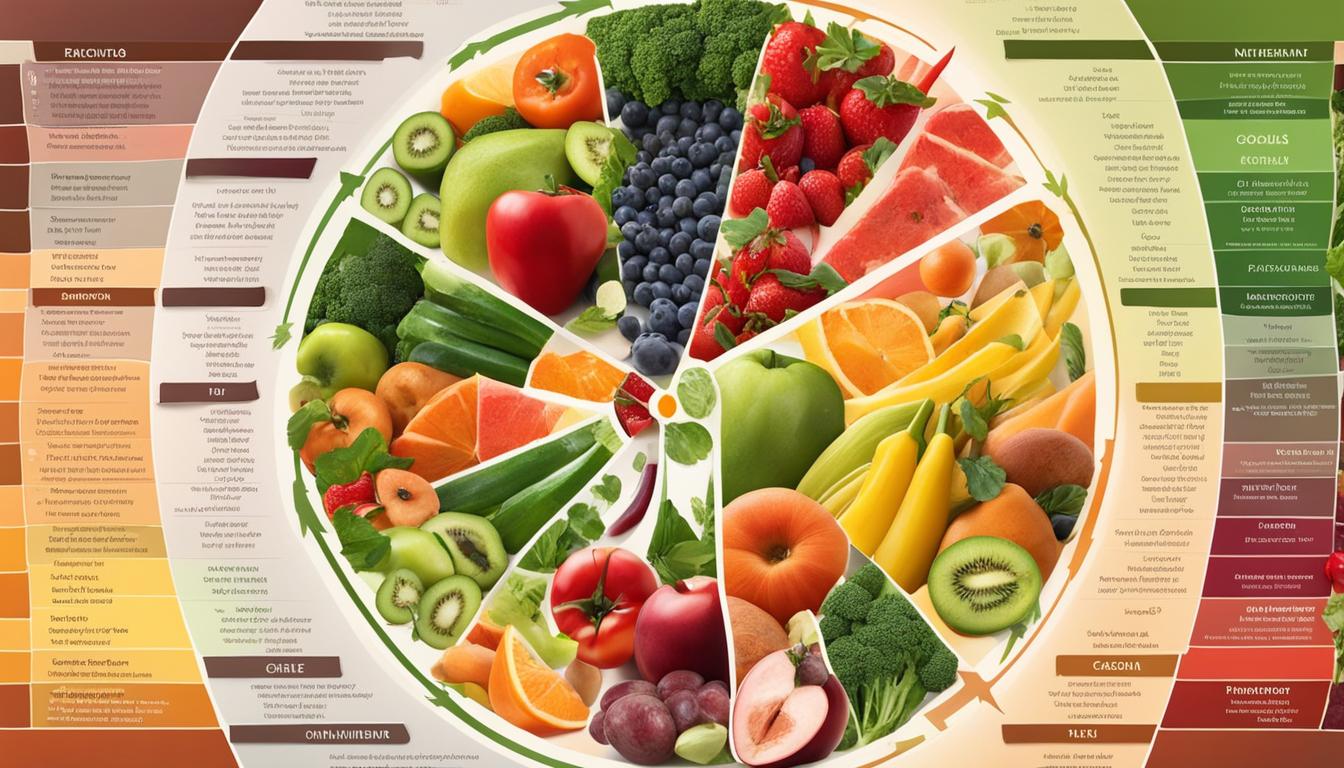Welcome to our comprehensive guide on personalized nutrition! In a world where one size does not fit all, personalized nutrition aims to bridge the gap between general nutrition advice and individual needs. By taking into account factors such as genetics, lifestyle, and health history, personalized nutrition creates customized dietary plans tailored to meet your unique requirements.
Are you ready to discover how personalized nutrition can optimize your health and wellness? Let’s dive in!
Key Takeaways:
- Personalized nutrition takes into account individual factors like genetics, lifestyle, and health history to create customized dietary plans.
- By tailoring nutrition advice to each person’s unique characteristics, personalized nutrition aims to optimize health and well-being.
- Advancements in technology, such as artificial intelligence and machine learning, are enhancing personalized nutrition by providing more targeted guidance.
- While personalized nutrition has great potential, it also faces limitations, including our limited understanding of complex gene-environment interactions.
- As research and technology continue to advance, personalized nutrition will play a significant role in shaping the future of nutrition science.
The Basics of Personalized Nutrition
Personalized nutrition, also known as nutritional genomics, nutrigenomics, or precision nutrition, is an innovative approach that tailors general nutrition advice to an individual’s specific needs and preferences. It takes into consideration various factors such as genetics, lifestyle, and health history to create individualized dietary recommendations.
The goal of personalized nutrition is to optimize health and well-being by providing actionable guidance that is tailored to each person’s unique characteristics. By incorporating personalized dietary recommendations, individuals can make informed choices about their food intake and better meet their personal health goals.
With the advancement of scientific research and technology, personalized nutrition offers a more precise approach to nutrition. It goes beyond a one-size-fits-all approach and recognizes that each individual has distinct nutritional needs. By understanding the intricate relationship between genetics, lifestyle, and nutrition, personalized nutrition can provide targeted guidance for optimal health.
The Benefits of Personalized Nutrition
- Customized approach: Personalized nutrition takes into account an individual’s unique characteristics, allowing for a tailored approach to diet and nutrition.
- Improved outcomes: By considering factors such as genetics and lifestyle, personalized nutrition can help optimize health outcomes and prevent chronic diseases.
- Greater adherence: With personalized dietary recommendations, individuals are more likely to adhere to their nutritional plan, leading to improved overall well-being.
- Enhanced quality of life: Personalized nutrition can improve energy levels, promote weight management, and enhance overall quality of life.
“The field of personalized nutrition holds great potential for improving health and well-being by providing individuals with customized dietary recommendations based on their unique needs and characteristics.”
Ultimately, personalized nutrition aims to empower individuals to make informed choices about their diet and lifestyle, helping them achieve their health goals and maintain long-term wellness.
The Science behind Personalized Nutrition
Personalized nutrition is a scientific approach that delves into the intricate workings of the human body to understand how food and nutrients impact our health. It explores the fascinating interactions between the human microbiome, genetics, and other biological factors to uncover the key drivers behind chronic diseases and overall well-being.
The human microbiome refers to the trillions of microbes that reside within our bodies, particularly in our digestive system. Emerging research has shown that these microbes play a crucial role in various aspects of our health, including digestion, metabolism, and immune function. Personalized nutrition aims to identify how different dietary interventions can modulate the microbiome to improve health outcomes.
Genetics also play a significant role in personalized nutrition. Our genes influence how our bodies process and utilize different nutrients, making each person unique in their nutritional requirements. By understanding individual genetic variations, personalized nutrition can provide tailored dietary recommendations that optimize nutrient absorption and utilization.

Uncovering the Links between Diet and Chronic Diseases
Chronic diseases, such as heart disease, diabetes, and obesity, have a complex etiology that involves both genetic and environmental factors. Nutrition research in personalized nutrition aims to unravel these intricate relationships by studying how diet influences gene expression, cellular pathways, and overall disease risk.
By investigating the interplay between genes, lifestyle factors, and nutrition, researchers can identify specific dietary patterns and nutrient profiles that can mitigate the risk of chronic diseases. This knowledge can then be translated into personalized dietary guidelines and interventions to improve overall health and well-being.
Advancing the Field of Personalized Nutrition
Personalized nutrition is an ever-evolving field that is continually advancing through ongoing research and technological advancements. The integration of cutting-edge technologies, such as omics analysis and artificial intelligence, allows for a deeper understanding of how individual differences impact nutritional needs.
With the increasing prevalence of chronic diseases and the growing awareness of the importance of nutrition in overall health, personalized nutrition holds immense potential to revolutionize the way we approach dietary recommendations. By personalizing nutrition advice based on an individual’s unique biology and circumstances, we can empower individuals to take control of their health and make informed choices that optimize their well-being.
How Personalized Nutrition Works
Personalized nutrition takes a comprehensive approach to understanding an individual’s unique nutrition needs. It involves a thorough assessment conducted by registered dietitian nutritionists, who consider various factors such as goals, habits, and health parameters. This assessment may include nutrition assessment, lab testing, genetic tests, and omics analysis.
Registered dietitian nutritionists are trained professionals who have the knowledge and expertise to evaluate an individual’s personal nutrition needs. They work closely with individuals to develop tailored nutrition plans that take into account their specific requirements and preferences.
“Personalized nutrition is not a one-size-fits-all approach. It is about understanding each person’s biology and lifestyle factors to provide targeted recommendations,” says Dr. Jane Smith, a registered dietitian nutritionist with over 10 years of experience in the field.
Lab testing and genetic tests play a crucial role in personalized nutrition. These tests provide valuable insights into an individual’s genetic makeup, metabolism, and nutrient deficiencies, allowing registered dietitian nutritionists to make evidence-based recommendations. Additionally, omics analysis, which includes the study of various biological factors like the microbiome and metabolome, further enhances the understanding of an individual’s unique nutrition needs.

Personalized Nutrition: Meeting Your Unique Needs
Personalized nutrition recognizes that each person is different and has unique nutritional requirements. By taking into account factors like genetics, lab test results, and personal nutrition needs, personalized nutrition can provide targeted recommendations and guidance for optimal health and well-being.
Registered dietitian nutritionists play a crucial role in the personalized nutrition process. Their expertise and knowledge allow them to analyze and interpret the data gathered from various assessments to create personalized nutrition plans. These plans take into account an individual’s dietary preferences, lifestyle, and health goals, ensuring that the recommendations are practical and achievable.
“Personalized nutrition is not just about the numbers and test results. It’s about understanding the individual as a whole and creating a plan that works for them,” emphasizes Dr. Sarah Johnson, a registered dietitian nutritionist specializing in personalized nutrition.
By considering all aspects of an individual’s health and lifestyle, personalized nutrition aims to provide long-term solutions that go beyond generic dietary guidelines. It empowers individuals to make informed choices about their nutrition, helping them achieve their health goals and improve their overall well-being.
Limitations of Personalized Nutrition
While personalized nutrition holds great promise, it is not without its limitations. One of the challenges lies in our limited understanding of the intricate genetic pathways, lifestyle habits, and environmental factors that influence an individual’s nutrition needs. The field of nutrition research is constantly evolving, and there is still much to learn about the complex interplay between these factors and their impact on health.
Another limitation of personalized nutrition is the need for an accurate food-tracking mechanism. Tracking food intake can be challenging, as it relies heavily on self-reporting, which may not always be precise. The effectiveness of personalized nutrition recommendations relies on having reliable and detailed information about an individual’s dietary habits, and any inaccuracies in the tracking process can affect the accuracy of the recommendations.
“Personalized nutrition faces challenges in deciphering the intricate relationship between genetic pathways, lifestyle habits, and environmental factors.”
Furthermore, personalized nutrition may not provide a one-size-fits-all solution for complex health conditions like obesity and diabetes. While tailored recommendations based on an individual’s unique characteristics can be beneficial, these conditions often require a multi-faceted approach, which may include lifestyle modifications, behavioral changes, and medical interventions.
Additional considerations
It is important to note that personalized nutrition is an evolving field, and ongoing research is continually shaping our understanding of its limitations. As new technologies and advancements in nutrition science emerge, we can expect to overcome some of these challenges and further enhance the effectiveness of personalized nutrition.
Despite these limitations, personalized nutrition remains a valuable approach to optimizing health and well-being. By taking into account an individual’s unique genetic makeup, lifestyle habits, and environmental factors, personalized nutrition can provide targeted recommendations that have the potential to improve overall health outcomes.

Advancements in Technology for Personalized Nutrition
New technologies are revolutionizing the field of personalized nutrition, enabling more accurate and targeted approaches to optimize individual health and well-being. Artificial intelligence (AI) is playing a pivotal role in this transformation, powering innovative solutions that enhance the effectiveness of personalized nutrition programs.
One area where technology is making a significant impact is in food recall methods. With the help of AI-driven algorithms, consumers can easily track their food choices and monitor their nutrient intake. Diet-tracking apps have become increasingly popular, allowing individuals to log their meals and receive real-time feedback on their nutritional status. These apps leverage machine learning to provide personalized recommendations based on individual goals and dietary requirements.
“Technology is making personalized nutrition more accessible and user-friendly, empowering individuals to take control of their own health.”
Another exciting advancement in personalized nutrition is the use of machine learning algorithms to provide targeted nutrition guidance. By analyzing large datasets, machine learning algorithms can uncover patterns and relationships that help generate personalized recommendations. These algorithms take into account various factors such as age, gender, activity level, and health conditions, enabling individuals to receive tailored advice that aligns with their specific needs.
With these technological advancements, personalized nutrition is becoming more accessible and user-friendly. Individuals can now leverage the power of AI, food recall methods, diet-tracking apps, and machine learning to make informed choices and achieve their health goals. These advancements are transforming the way we approach nutrition, paving the way for a future where personalized nutrition is the norm.

The Future of Personalized Nutrition
As personalized nutrition continues to evolve, it holds immense promise for improving health and well-being at every stage of life. With advancements in technology and ongoing research, the field is poised to shape the future of nutrition science.
One of the key benefits of personalized nutrition is its ability to provide individualized nutrition recommendations. By considering factors such as genetics, age, and lifestyle, personalized nutrition can create tailored eating plans that address specific nutritional needs. This targeted approach can help optimize health outcomes and improve overall well-being.
Furthermore, personalized nutrition has the potential to play a significant role in preventive healthcare. By identifying and addressing potential nutritional deficiencies or imbalances early on, personalized nutrition programs can help reduce the risk of chronic diseases and support long-term health maintenance.
Looking ahead, the integration of personalized nutrition into digital health platforms and tools will further enhance its accessibility and effectiveness. By leveraging patient data and advanced analytics, personalized nutrition programs can provide more accurate and comprehensive insights into individual nutrition needs. This data-driven approach will enable healthcare professionals to deliver personalized nutrition guidance that is tailored to each person’s unique requirements.
Understanding Personalized vs. Precision Nutrition
In the field of nutrition, two terms that often come up are personalized nutrition and precision nutrition. While they may sound similar, they have distinct differences in the factors they consider when creating tailored recommendations.
Precision nutrition primarily relies on scientific data and genetic information to provide targeted recommendations for individuals. It takes into account specific genetic variations and utilizes them to create personalized dietary plans. This approach is rooted in nutrigenomics, which explores the interaction between genes and nutrition. By analyzing an individual’s genetic information, precision nutrition aims to optimize health outcomes by identifying the most suitable dietary interventions.
On the other hand, personalized nutrition takes a broader approach, considering a range of factors like genetics, age, lifestyle, and environmental influences. It recognizes that nutrition is not solely determined by genes and aims to provide recommendations that align with a person’s unique needs and preferences. This approach goes beyond genetic information and incorporates factors such as epigenetics, which examines how gene expression can be influenced by lifestyle and environmental factors. By considering these additional elements, personalized nutrition can offer a more comprehensive and holistic approach to optimizing health and well-being.

Key Differences: Precision Nutrition vs. Personalized Nutrition
- Scientific Data: Precision nutrition relies heavily on scientific data, including genetic information, to provide targeted recommendations. Personalized nutrition, while also considering scientific research, incorporates a wider range of factors.
- Genetic Information: Precision nutrition focuses on identifying the specific genetic variations that may impact a person’s dietary needs. Personalized nutrition acknowledges genetic factors but also considers other influences.
- Targeted Recommendations: Precision nutrition aims to provide highly specific recommendations based on an individual’s genetic makeup. Personalized nutrition takes a more comprehensive approach, considering multiple factors to tailor recommendations.
- Nutrigenomics and Epigenetics: Precision nutrition is closely associated with nutrigenomics, which explores the relationship between genes and nutrition. Personalized nutrition expands on this by incorporating additional factors such as epigenetics, which examines how lifestyle and environmental factors can influence gene expression.
While precision nutrition focuses on utilizing genetic information to provide targeted recommendations, personalized nutrition takes a more holistic approach, considering a broader range of factors like genetics, age, lifestyle, and environmental influences.
Understanding the distinctions between precision nutrition and personalized nutrition is key to navigating the evolving field of nutrition science. Both approaches have their merits and can contribute to optimizing health and well-being, but they differ in the factors they consider when tailoring recommendations. By embracing the unique characteristics of each approach, individuals can make informed choices about the type of nutrition guidance that aligns best with their needs and goals.
The Role of Personalized Nutrition in Healthcare

Nutritionists play a crucial role in integrating personalized nutrition principles into healthcare. By using advanced patient data, they create nutrition programs that address individual needs and promote optimal health. Patient data includes information such as food allergy tests, health conditions, nutrition habits, and fitness levels. With the help of digital health platforms and tools, nutritionists analyze this data to develop tailored nutrition plans that guide patients towards their health goals.
One of the key aspects of personalized nutrition in healthcare is the consideration of individual nutrition needs. Nutritionists take into account various factors, such as an individual’s genetic makeup, age, lifestyle, and specific health concerns. By understanding the unique combination of these factors, personalized nutrition programs can provide targeted recommendations that support the overall well-being of patients.
Digital health platforms also contribute to the success of personalized nutrition in healthcare. These platforms enable nutritionists to access and analyze patient data efficiently, allowing for a more comprehensive understanding of their health status. With this information, nutritionists can offer personalized dietary guidance and track the progress of patients over time. The integration of digital health platforms not only enhances the accuracy of personalized nutrition programs but also facilitates ongoing support and communication between nutritionists and patients.
Conclusion
Personalized nutrition is revolutionizing the way we approach our diets and overall health. By tailoring nutrition advice to individual needs, personalized nutrition offers a more effective and targeted approach to optimizing well-being.
With the help of a Personalized Nutrition Guide, individuals can create an individualized diet plan that aligns with their unique characteristics. This includes customized meal recommendations and tailored nutrition advice based on factors like genetics, lifestyle, and health history.
A personalized nutrition program goes beyond generic dietary guidelines, providing a personalized eating plan that takes into account an individual’s specific needs and goals. This precision nutrition approach is the future of nutrition science, as it holds great promise in improving health outcomes for individuals of all ages and backgrounds.
As we embrace the future of nutrition, the field of personalized nutrition will continue to evolve and advance. With ongoing research and advancements in technology, we can expect even more precise and targeted nutrition recommendations that will further enhance our health and well-being.
FAQ
What is personalized nutrition?
Personalized nutrition aims to bridge the gap between general nutrition advice and individual needs by considering factors like genetics, lifestyle, and health history to create customized dietary plans.
What does personalized nutrition take into account?
Personalized nutrition considers factors such as genetics, lifestyle, and health history to tailor nutrition advice to each person’s unique characteristics.
Why is personalized nutrition important?
Personalized nutrition can help optimize health and wellness by providing tailored nutrition advice that is specific to each individual’s needs.
How does personalized nutrition work?
Personalized nutrition involves a comprehensive assessment of an individual’s goals, habits, and health parameters, which may include routine lab testing, genetic tests, and omics analysis. This analysis helps identify an individual’s unique nutrition needs and allows for targeted recommendations.
What are the limitations of personalized nutrition?
Personalized nutrition faces limitations in our understanding of the complex relationships between genes, lifestyle, and environmental factors. Accurate tracking of food intake can also be challenging, affecting the accuracy of personalized nutrition recommendations.
How can technology enhance personalized nutrition?
New technologies like artificial intelligence, improved food recall methods, diet-tracking apps, and machine learning have the potential to enhance personalized nutrition by improving the accuracy of dietary intake assessments and providing more targeted nutrition guidance.
What is the future of personalized nutrition?
The future of personalized nutrition lies in further research and a better understanding of how individualized nutrition and lifestyle recommendations can improve health at every stage of life. Ongoing studies and advancements in technology will continue to shape the field of personalized nutrition.
How does personalized nutrition differ from precision nutrition?
Precision nutrition focuses on using scientific data and genetic information to provide targeted recommendations, while personalized nutrition takes into account a broader range of factors like genetics, age, and lifestyle.
How is personalized nutrition incorporated into healthcare?
Many nutritionists incorporate personalized nutrition principles into their daily practice and create nutrition programs based on advanced patient data. They utilize various types of patient data, including food allergy tests, health conditions, nutrition habits, and fitness levels. Digital health platforms and tools are also used for data analysis in personalized nutrition.
What is the role of personalized nutrition in the future of nutrition?
Personalized nutrition is an innovative approach that tailors nutrition advice to individuals based on their unique needs and characteristics. As technology and research in personalized nutrition continue to advance, the field will play a significant role in the future of nutrition science.


